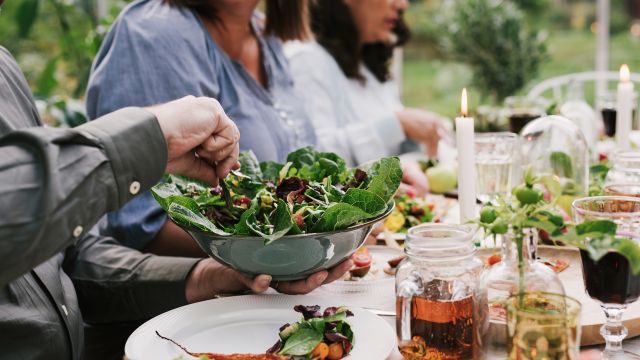The average portion size in the United States has been growing, along with the average waist and dress size, for decades. Meanwhile, American life expectancy has declined according to data from the first half of 2020 released by the Centers for Disease Control and Prevention in February 2021. American women are now expected to live for 80.5 years and men for 75.1 years, compared to 81.4 and 76.3 years in 2019. While much of this decline can be attributed to the COVID-19 pandemic, American life expectancy has not significantly increased in years prior.
It’s also no coincidence that Americans are eating more and living shorter lives. When you take in more calories than you’re able to burn off through exercise, you gain weight. Obesity then puts you at risk for life-threatening conditions like:
- Heart disease
- Diabetes
- High blood pressure
- A long list of cancers, including breast, colon and pancreatic cancer
If food choices play such a large role in deciding someone’s lifespan, what can Blue Zones—regions with the world’s longest living people—like Okinawa, Japan, teach us about diet and nutrition?
We asked Kalyani Alladi, PhD, RD, a registered dietician nutritionist specializing in critical care at Medical City McKinney in Texas, to discuss the simple food principle many Okinawans live by.
What’s the 80 percent rule?
“The expression, hara hachi bu literally means ‘80 percent stomach’ in Japanese,” explains Dr. Alladi. “It’s based on the belief that if you slow down your eating and stop when you’re 80 percent full, you’ll feel more satisfied.”
Why? When you eat slowly, you chew more carefully. That lets you savor the flavors and really enjoy your food—and it gives your stomach enough time to tell your brain it’s full. Since it takes about 15 to 20 minutes for fullness signals to reach your brain, eating too fast can easily lead to overeating, says Alladi.
The 80 percent rule can improve your quality of life
Unlike fad diets and weight loss supplements, this simple practice can help you lose weight safely and keep it off. It lets you to eat 20 percent fewer calories without feeling deprived (so you won’t swing between hunger and binge eating). By helping you keep off excess weight, the 80 percent rule also lowers your risk of illnesses like heart disease and diabetes and may improve your quality of life.
That might be one reason why Okinawans have one-fifth the rate of heart disease, one-fourth the rate of breast cancer and one-third the rate of dementia compared to Americans. They also enjoy one of the world’s longest life expectancies and the most years of healthy, disability-free living.
A growing number of studies support the link between eating smaller portions and living longer. One team of researchers followed a group of men and women on a calorie-restricted diet for six months. Regardless of their exercise habits, all participants lost weight. They also experienced:
- Better blood sugar control
- More stable hormone levels
- Less of the DNA damage that happens with aging
These anti-aging and disease-fighting effects mean the 80 percent rule is just one way to lower your RealAge. To find out if you’re aging at a healthy rate—or if your body thinks it’s older than your biological age—take Sharecare’s RealAge Test. After reviewing your eating, sleeping, exercise habits and more, the test will determine your RealAge. It’ll also give you tips and advice on how to live the longest, healthiest life possible.
How can you tell if you’re 80 percent full?
The best way to stick to the 80 percent rule is to divide your plate in half before eating, instructs Alladi. Only eat the first 50 percent of your food to begin with; chew slowly and savor every single bite. Concentrate on the food—think about its color, flavor and texture. This is called mindful eating, she explains.
After you finish the first half, put your fork down and let a few minutes pass. Then ask yourself, "Am I really still hungry?" If you're satisfied, stop. If not, eat half of the remaining 50 percent—half of what’s left.
Still hungry? Divide the leftover food in half again.
It’s especially important to remember this trick in restaurants, where tempting bowls of your favorite foods often come in extra-large sizes. Ask for a to-go container at the start of the meal and divide the plate as soon as it arrives. Another option is to request the lunch portion.
Beat the urge to binge
“Everybody has cravings, but if you constantly remind yourself that you’re on a diet, you’re more likely to experience binge impulses,” says Alladi. “But when you follow the 80 percent principle, there’s no forbidden fruit. If you feel like you really need to eat something, measure out one serving and just have a small amount of the treat you love.”
Other ways to control your portions:
- Start with a salad: Eating a salad before meals can decrease calorie intake by 10 to 12 percent, says Alladi. Salads are high in fiber, which helps you feel full sooner and keeps you satisfied longer. Since you have to spend more time chewing a salad, it also gives your brain a chance to catch up with your stomach.
- Don’t eat in front of the TV: If you eat in front of the TV, you won’t pay as much attention to your food. The distraction—not to mention all the restaurant ads—may easily lead to choices you’d regret.
- Step away from your desk: “Don’t eat in a high-stress atmosphere,” recommends Alladi. “It causes your brain to release the stress hormone, corticotropin factor, which can trigger ‘stress eating.’ Increased stress levels lower your motivation to eat nutritious foods.”
Another trick: Swap breakfast and dinner portions. Okinawans eat their largest meal in the morning, their smallest meal in the evening, and then don’t eat anything else before bed.
There are many benefits to early eating, including better weight control. One reason people overeat at night is the tendency to wait until they’re starving and exhausted. Then their willpower is gone and they wind up bingeing on high-calorie foods.






